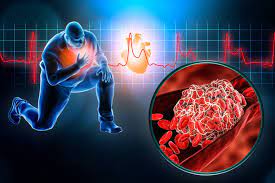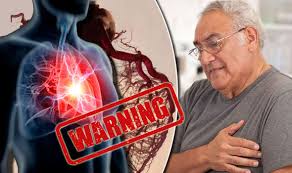Understanding the Connection between Hypertension, Heart Disease, and Stroke
Have you ever felt like an elephant was sitting on your chest, or that your heart was damaged? These are common symptoms experienced by people with hypertension, heart disease, and stroke. In this article, we will explore the relationship between these conditions and explain how they are related.

Hypertension, also known as high blood pressure, is a common condition that affects millions of people worldwide. When the force of blood against the walls of your arteries is consistently too high, it can cause damage to your heart and blood vessels. Over time, this damage can lead to the development of heart disease.
Heart disease is a broad term that encompasses several different conditions that affect the heart. Cardiac lesions are one type of heart disease that can occur as a result of hypertension. Cardiac lesions are areas of damage or scarring on the heart that can lead to irregular heartbeats, heart failure, or other complications.
If left untreated, hypertension and heart disease can also increase the risk of stroke. A stroke occurs when the blood supply to the brain is interrupted, either due to a blockage or bleeding in the brain. This interruption can cause damage to the brain and can lead to a range of physical and cognitive disabilities.
So, how are hypertension, heart disease, and stroke related? Simply put, hypertension can lead to heart disease, and heart disease can increase the risk of stroke. All three conditions are linked by the fact that they involve damage to the blood vessels in your body.
Identifying the highlighted vessel can also play a role in understanding these conditions. Your blood vessels are responsible for carrying blood and oxygen to all parts of your body, including your heart and brain. When these vessels become damaged, it can impact the flow of blood and oxygen, which can lead to a range of health problems.
In conclusion, if you are experiencing symptoms like an elephant sitting on your chest or feel that your heart is damaged, it is important to talk to your doctor. Hypertension, heart disease, and stroke are serious conditions that can have a significant impact on your health and well-being. By understanding the connection between these conditions and taking steps to manage them, you can reduce your risk of complications and improve your quality of life.
One of the key ways to manage hypertension, heart disease, and stroke is through lifestyle changes. Eating a healthy diet, exercising regularly, quitting smoking, and reducing stress can all help to lower your risk of developing these conditions or managing them if you have already been diagnosed. Your doctor may also recommend medications to help control your blood pressure or reduce your risk of complications.
If you have already been diagnosed with hypertension, heart disease, or stroke, it is important to work closely with your healthcare provider to manage your condition. This may involve regular check-ups, monitoring your blood pressure or cholesterol levels, and making changes to your medication regimen as needed.
In addition to medical treatment, there are also several complementary therapies that may help to improve your heart health and reduce your risk of complications. These may include practices like meditation, yoga, or acupuncture, as well as supplements like omega-3 fatty acids or coenzyme Q10.
Ultimately, the key to managing hypertension, heart disease, and stroke is through a combination of lifestyle changes, medical treatment, and self-care. By taking steps to improve your heart health and reduce your risk of complications, you can live a happier, healthier life. So if you are experiencing symptoms like an elephant sitting on your chest or feel that your heart is damaged, don’t hesitate to talk to your doctor and take action to protect your heart health.
It’s important to note that hypertension, heart disease, and stroke can affect anyone, regardless of age, gender, or background. However, certain factors can increase your risk of developing these conditions. These may include having a family history of heart disease or stroke, being overweight or obese, smoking, and having high levels of stress.
In addition, certain medical conditions like diabetes or sleep apnea can also increase your risk of hypertension, heart disease, and stroke. If you have any of these conditions, it’s important to work closely with your doctor to manage them and reduce your overall risk.
If you’re concerned about your heart health, there are several steps you can take to reduce your risk of developing hypertension, heart disease, and stroke. These may include:
Eating a healthy diet that is rich in fruits, vegetables, whole grains, and lean protein sources
Exercising regularly, aiming for at least 30 minutes of moderate-intensity exercise most days of the week
Quitting smoking or using other tobacco products
Reducing your alcohol intake
Managing your stress levels through practices like meditation, deep breathing, or yoga
Getting regular check-ups with your doctor to monitor your blood pressure, cholesterol levels, and overall heart health
By taking these steps, you can help to protect your heart health and reduce your risk of developing hypertension, heart disease, and stroke. Remember, the key to managing these conditions is early detection and treatment, so don’t hesitate to talk to your doctor if you have any concerns about your heart health.
It’s important to note that it can affect anyone, regardless of age, gender, or background. However, certain factors can increase your risk of developing these conditions. These may include having a family history of heart disease or stroke, being overweight or obese, smoking, and having high levels of stress.

In addition, certain medical conditions like diabetes or sleep apnea can also increase your risk of heart disease, and stroke. If you have any of these conditions, it’s important to work closely with your doctor to manage them and reduce your overall risk.
If you’re concerned about your heart health, there are several steps you can take to reduce your risk of developing hypertension, heart disease, and stroke. These may include:
Eating a healthy diet that is rich in fruits, vegetables, whole grains, and lean protein sources
Exercising regularly, aiming for at least 30 minutes of moderate-intensity exercise most days of the week
Quitting smoking or using other tobacco products
Reducing your alcohol intake
Managing your stress levels through practices like meditation, deep breathing, or yoga
Getting regular check-ups with your doctor to monitor your blood pressure, cholesterol levels, and overall heart health
By taking these steps, you can help to protect your heart health and reduce your risk of developing heart disease, and stroke. Remember, the key to managing these conditions is early detection and treatment, so don’t hesitate to talk to your doctor if you have any concerns about your heart health.



